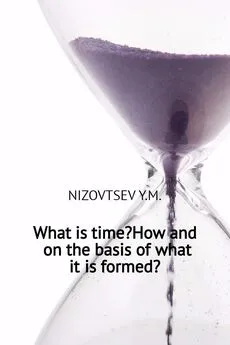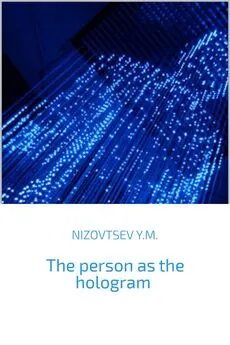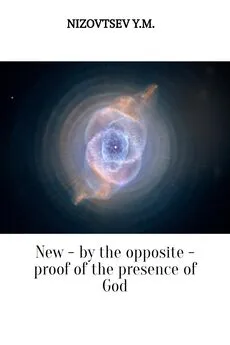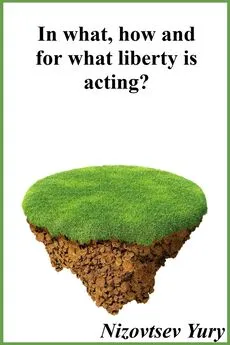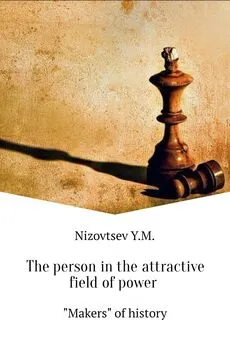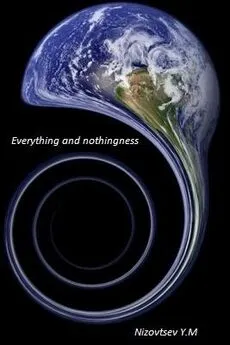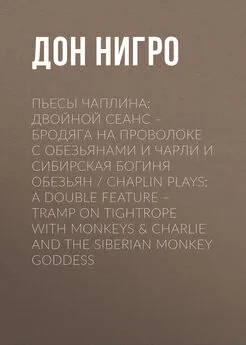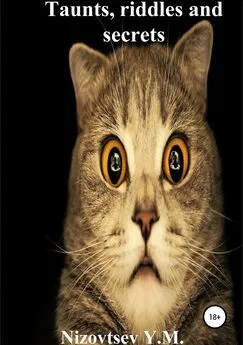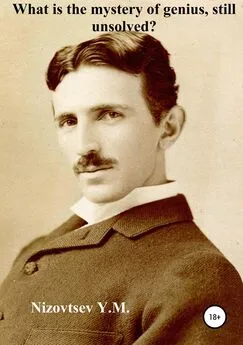Юрий Низовцев - What is time? How and on the basis of what it is formed?
- Название:What is time? How and on the basis of what it is formed?
- Автор:
- Жанр:
- Издательство:Литагент Selfpub.ru (искл)
- Год:неизвестен
- ISBN:нет данных
- Рейтинг:
- Избранное:Добавить в избранное
-
Отзывы:
-
Ваша оценка:
Юрий Низовцев - What is time? How and on the basis of what it is formed? краткое содержание
What is time? How and on the basis of what it is formed? - читать онлайн бесплатно ознакомительный отрывок
Интервал:
Закладка:
The reality is manifested as a result of copying of information from it in two ways: on the one hand, information goes from feelings – from sight, hearing, taste, sense of smell, touch – the continuous, changing picture of everything that surrounds the person outside and inside; on the other hand, the information from memory, processed and understood earlier, which was being selected by consciousness each instant by results of perception of separate fragments of the reality is superimposed on this changing picture, for example, the person pays attention to another person and reminisces him; leads car, observing traffic rules; etc. That is the person thereby creates own time, or "now" in which he can live as wants and can.
Process doesn't interrupt even in a dream: consciousness, consuming information, operate in live object always, scooping information from within and outside of a body-carrier, leaving him only after death. Set of the live objects on the planet creating the unidirectional relocation of information copies is considerable, and this process goes on all available channels in the calculation on the total consumption. Significant information is registered and stored for the guaranteed access.
The unidirectionality of beingness changes, which we call time, wouldn't exist in the form known to us for each consciousness without similar asymmetrical action of uncountable consciousnesses in beingness.
People who, unlike all remaining objects of the material world known to us, are capable to recognize this objective process, represent it as future, real, last, supposing that the acquired information can be transferred from the past to the future, changing it. This widespread representation is based on misunderstanding of the fact that the past and the future can exist only in imagination of the person, but he lives only in own present time.
Only one present time exists really for the person. Therefore he intuitively called it just so. He realizes himself, thinks, feels and acts just in it, but not in the past or in the future: the past arises in his imagination in "now" at the moment of a remembering, and the future the person doesn't know and can only project it in mind too in present time.
"Now" of the person, or his own time consists in moments of processing of the information coming to consciousness in the form of the copies of these or those data which sequentially arrive from the material objects surrounding consciousness of the living being.
Thus, the active echelon of infinite beingness, providing its unidirectional change without which life is impossible, is consciousness. It receives as a result some kind of channel for the infinite development in the finite manifestations. Consciousness sequentially fixes changes of the material objects available to it which part consciousness accumulates, remembering, and uses if necessary. At this processing by consciousness of the acquired information is objective process so as goes automatically and has no relation to imaginations. The material objects, which don't have consciousness, aren't capable to recognize in each other data, necessary for themselves and, especially, to decrypt them. Therefore beingness can be manifested, as that, only in the presence of the active element – consciousness.
This processing by consciousness of the acquired information the human divides into intervals between any events which he names as periods. The most significant periods for the person are connected to natural cycles: the day reflecting a complete revolution of Earth round its pivot-center, as well as night, day, seasons, the annual cycle reflecting a complete revolution of Earth round the Sun.
"Now" comprises in itself, i.e. eventually, in the human consciousness, restricted by opportunities and resources of the carrier of consciousness, everything, the whole world available to the human consciousness in a form more and more every instant growing information volume, promoting detection and to demonstration of surrounding of the human consciousness. This in itself gradually "burdens" human consciousness and, eventually, the structure of a limited human body doesn't withstand this "gravity" and collapses – life comes to an end. However boundless opportunities of the infinite consciousness allow him again and again "to plunge" into the finite: consciousness continues to live again and again, "dropping" each ended life in "basket" of own immense memory. The same happens and with each human civilization, doing her life inevitably limited.
Own time, or "now" of the person, and actually process of receiving and processing information by consciousness, explains cryptic till this day the fact of the manifestation in the child of consciousness and saving consciousness by the person during life.
We know from practice that consciousness is not manifested at the children in the case of absence of live conversation with him in the childhood of other people. Really, communication from the perspective of filing at first to the child of voice and iconic information, which is clear for him so as it is connected to meal, walks, entertainments, etc., gradually creates at him ability of understanding environmental and ability to operate according to this understanding. To do this he initially did not even need to talk. The main thing is the fact that he on examples from adults learns to select from surrounding only those data which he can decrypt and interpret. If the similar information channel is absent, the child can't "reach" human "now" and he remains in time of the living being which doesn't have self-consciousness, for which the actions based generally on reflexes and instincts are characteristic.
It is known that the person, the long time remaining in perfect loneliness without information influx enough quickly runs wild or, as speak, "goes crazy". There is it besides because "now" of the person is formed by copies of the same external. There is only information from within as the form of some memories as well as instinctive and reflex responses for his consciousness. As a result, "now" is slowed down that is manifested in the actual stop of time for him, and the person turns into the being possessing only by primary instincts and reflexes.
Now consciousness in representation of science is considered secondary, a consequence of natural processes. As you can see, everything occurs on the contrary: the unidirectional change of beingness as conjoint complex of the material objects, space and time happens in case of constant involvement of consciousness. Absence of consciousness in beingness means the actual absence of beingness so as even if to assume existence of such beingness, who will be able grasp this beingness, so no matter is it or not, this will still remain unknown to anyone, because that someone doesn't exist. And, on the contrary: without support on beingness consciousness is lost as there are not apps for it, or there is nothing to do to it. Such consciousness, which is nothing to do, can't be. About what development of consciousness it is possible to speak here?
The material beingness in the infinite variety is always together with the material echelon – by consciousness, without which this variety couldn't be manifested. The term "always" means that outside duration the consciousness isn't present, hence, there is no beingness also. Therefore a condition of their coexistence is time. In its finite duration the consciousness only and is capable to interact with remaining beingness, to open it as consciousness can until, and reveal itself into it in the changes.
Thus, not "the thing in itself (the transcendental object)” is outside any thinking" as Kant [3] claimed, but both material objects – a thing and consciousness – only and coexist really in the interaction so as not consciousness in itself only influences on itself and surrounding it, but and the thing always influences on consciousness. This mutual influence means that the friend without friend they are lost. Therefore Fichte's thought: "I do myself: own beingness by means of the thinking … I – it is unconditional, is own creation" [4], is correct only half. Without support of consciousness on remaining beingness consciousness can create nothing, including itself. Though, certainly, it is difficult to deny the leading role of consciousness in the process of interaction.
For the person who has consciousness, itself consciousness remains as "the thing in itself (the transcendental object)” at any level of development of the person. It is implicit the person himself recognized this fact long ago, having declared that consciousness is incorporeal, ideal. Really, consciousness can't be touched, but after all and a magnetic field we can't feel.
Actually there is nothing more real than consciousness thanks to which, actually, all and occurs, more precisely, everything is manifested.
Consciousness as the highest material component of beingness responds for maintenance of an animateness of beingness and manifests it variously, taking care of itself and it. However similar high-organized form of a matter has no basis in our three dimensional measurement, and only goes it through the appropriate carriers, restricting itself in this finite who, naturally, can only rejoice and be surprised to this arrival but who will not be able to penetrate into structure of matter of the "highest" measurement. Therefore we can only build guesses about consciousness and our own mission, as temporal owners of consciousness. You can read about it in the final chapter and in the source [1].
So, consciousness and beingness can't exist the friend without friend, they are uniform however each of them, is also uniform in a basis unknown to us, but enters interaction in a divided state.
Each consciousness is surrounded by other consciousnesses, all of them in turn, are shrouded by material objects of another kind which offer themselves to individual consciousnesses so as those are capable to accept them into own existence. And consciousnesses themselves can operate in measurements, which are others for him, only via the material carriers of these measurements. Similar process of determination of itself in the finite allows personal consciousness, at least, to live in the lowest forms, but still feeling itself.
The highest form of consciousness, i.e. a self-aware form, is already capable not simply to feel itself, but – to separate itself from all other and therefore purposefully to influence this separated.
What is, actually, most of all necessary for consciousness from the world in the finite, and what it can do here?
Consciousness is capable on a lot of things: both to think, and to act, both to love and hate, and to fear, and to rejoice. Consciousness can learn world around and itself, and does it, developing itself in this process.
But accumulation of knowledge in itself can go infinitely that makes senseless it. One aspiration for knowledge supersedes all other aspirations, which are no less, and perhaps more important for the development of consciousness. People perfectly understand that from multi knowledge they don't become better, it often burdens them, and individual consciousness wondering just to what it is inclined, to what entails it.
Ordinary life with its cares, burdens, chagrin, disturbances, grieves and rare moments of pleasure, delight, of course, is good in itself, allowing each personal consciousness be in the thick of things, and not only as a supernumerary. Here some throb of the General is felt with which the separate consciousness merges. For this reason each person doesn't wish to be separated from this General, and so clings to life.
But knowledge and life – whether this most important out of that to what consciousness aims?
Читать дальшеИнтервал:
Закладка:
